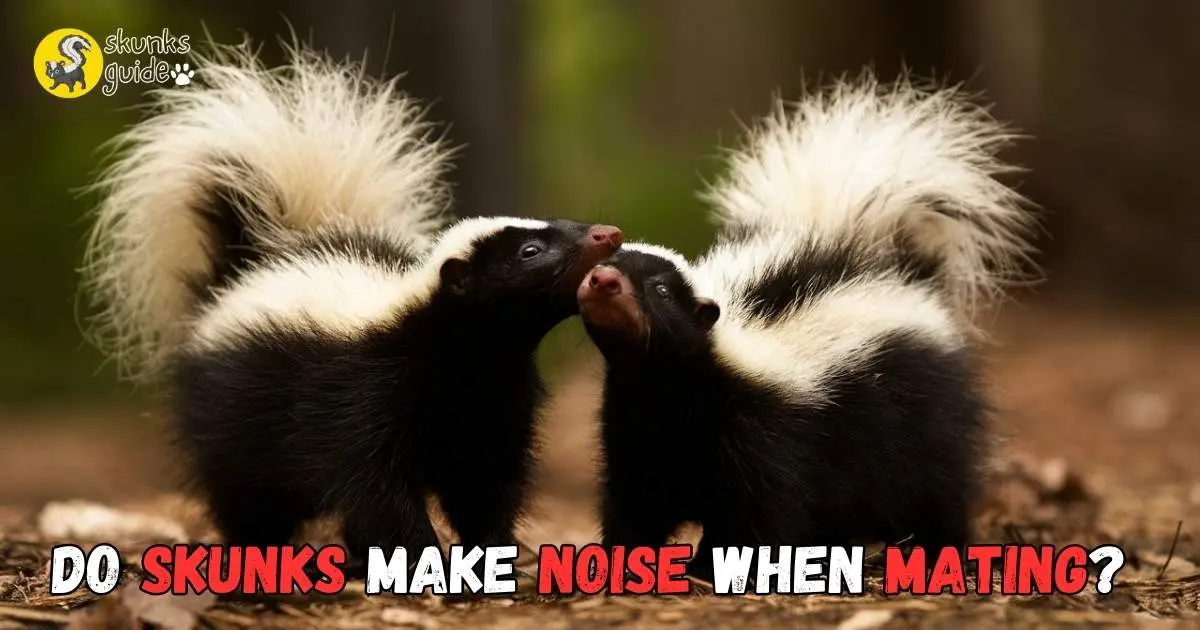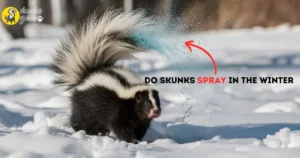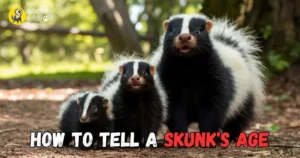Do Skunks Make Noise When Mating?
Yes, skunks make noise when mating! They use different sounds to communicate during this important time. Based on my research, I’ve learned just how vocal skunks can be during mating season. If you want to understand more about how these animals talk to each other and why, keep reading—you’ll find some cool insights ahead!
Introduction To Skunk Behavior
Skunks are fascinating creatures. They are known for their unique behavior and sounds. Understanding their behavior helps us appreciate these animals more. Many people wonder about their mating rituals and if they make noise.
The Secretive Life Of Skunks
Skunks are mostly nocturnal animals. They prefer to stay hidden during the day. Here are some interesting facts about their secretive life:
- Skunks have excellent hearing.
- They can smell well, helping them find food.
- They are solitary, but come together during mating season.
- Skunks often create burrows for shelter.
These behaviors help them survive in the wild. They are shy and avoid confrontation. When threatened, they use their famous spray as a defense mechanism.
Mating Rituals In The Animal Kingdom
Mating rituals vary widely among animals. Skunks have their own unique practices. Here’s a closer look at skunk mating:
| Mating Behavior | Description |
|---|---|
| Breeding Season | Occurs in late winter to early spring. |
| Courtship | Males follow females and display their scent. |
| Vocalizations | Skunks may grunt or make soft noises. |
| Duration | Mating lasts for a few days. |
During mating, skunks may make soft noises. These sounds help communicate between partners. Males may chase females to show interest. This behavior is common in the animal kingdom. It ensures the survival of their species.
The Mating Season Of Skunks
The mating season for skunks occurs in late winter to early spring. This is when male skunks search for females. They become more active and vocal during this time. The calls and noises they make signal their intentions. Observing these sounds can reveal fascinating insights into their behavior.
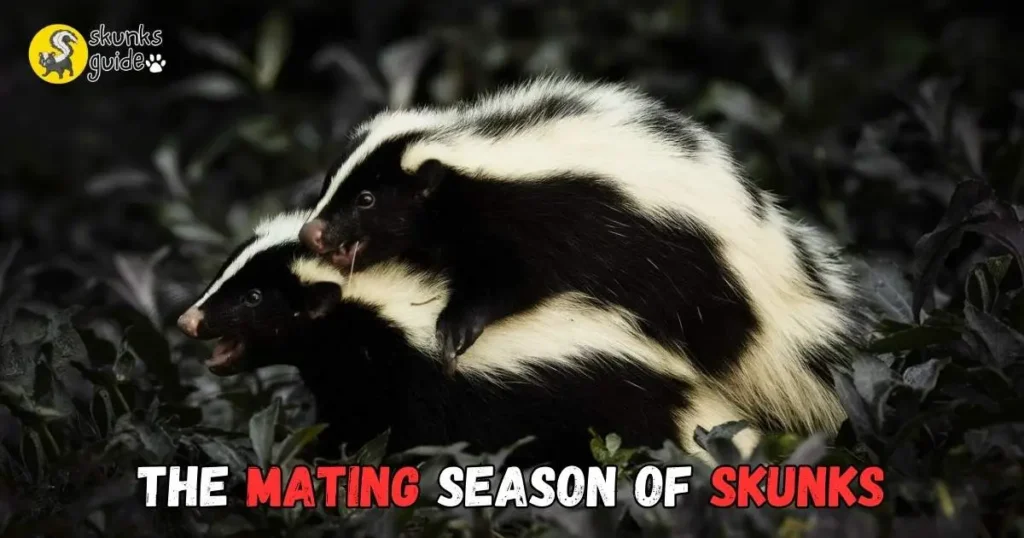
When Love Is In The Air
As the mating season approaches, skunks become more social. Males often roam widely in search of females. Their vocalizations increase significantly during this time. Skunks make a variety of sounds, including:
- Chirps
- Grunts
- Whines
- Hisses
These sounds serve different purposes. Males may call to attract females. They also use sounds to communicate with other males. This can help to establish territory and dominance.
Signs Of Skunk Courtship
During courtship, skunks display unique behaviors. These behaviors indicate that they are ready to mate. Some common signs include:
- Males following females closely.
- Frequent vocalizations between the pair.
- Physical displays, such as tail lifting.
These actions are important in skunk mating rituals. They help reinforce bonds between potential mates. Observing these behaviors can be quite interesting for nature lovers.
| Behavior | Description |
|---|---|
| Chirping | Short, high-pitched sounds made by males. |
| Grunting | Deep sounds that indicate excitement or aggression. |
| Tail Lifting | Shows readiness to mate and signals interest. |
Do Skunks Vocalize During Mating?
Skunks are fascinating creatures. They are known for their strong scent. But do they make noise while mating? Yes, skunks do vocalize during this time. Their sounds can be quite interesting.
Myths And Facts
Many myths surround skunks and their vocalizations. Here are some common beliefs:
- Myth: Skunks are silent during mating.
- Fact: Skunks make various sounds while mating.
- Myth: Only male skunks vocalize.
- Fact: Both males and females vocalize during mating.
Skunk vocalizations include chirps, growls, and purring. These sounds help attract mates and communicate.
Understanding Skunk Communication
Skunks are fascinating creatures. Their methods of communication go beyond just scent. During mating season, skunks use various signals to convey their feelings. Knowing how skunks communicate can deepen our understanding of these unique animals.
Beyond Scent: Vocal Signals
Skunks have a range of vocalizations. These sounds help express emotions and intentions. Here are some common vocal signals:
- Chirps: Short, high-pitched sounds often made during courtship.
- Growls: Low, rumbling sounds that signal aggression or fear.
- Whines: Soft sounds indicating distress or submission.
These vocal signals play a vital role in skunk behavior. They help skunks find mates and establish territory.
The Language Of Love In Skunks
During mating season, skunks become more vocal. This is the time for courtship rituals. Male skunks often call out to females.
Here are some key aspects of their mating calls:
- Frequency: Males call more frequently to attract females.
- Volume: Louder calls indicate stronger intentions.
- Variety: Different sounds can convey different messages.
| Sound Type | Meaning |
|---|---|
| Chirps | Attraction |
| Growls | Warning |
| Whines | Submission |
Understanding these sounds helps us appreciate skunk behavior. Their communication is essential for finding mates and ensuring survival.
Decoding Skunk Mating Calls
Skunks have unique ways of expressing themselves during mating season. Understanding their sounds can reveal much about their behavior. Let’s explore the fascinating world of skunk romance through their calls.
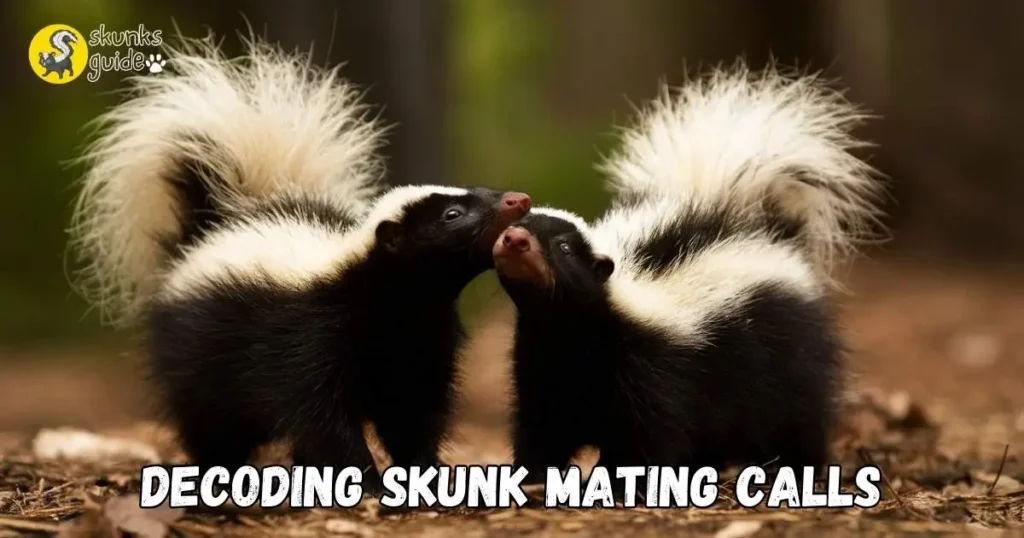
The Sounds Of Skunk Romance
Skunks make various noises while courting. These sounds serve different purposes. Here are some common mating calls:
- Chirps: Short, sharp sounds indicating excitement.
- Growls: Deeper sounds that may signal aggression.
- Whines: High-pitched calls showing distress or need.
- Hisses: Warning sounds to deter threats.
Each sound plays a role in attracting mates. They help establish territory and communicate readiness. Skunks often vocalize more during the night. This is when they feel most secure.
Interpreting Nocturnal Chatter
Nighttime is busy for skunks. Their chatter can be confusing. Here’s how to interpret their calls:
| Sound | Meaning |
|---|---|
| Chirping | Excitement and interest in a mate. |
| Growling | Establishing dominance or warning others. |
| Whining | Signals distress or need for attention. |
| Hissing | A warning to potential threats. |
Understanding these sounds helps observers appreciate skunk behavior. Each noise has a purpose and meaning. Listening closely reveals the dynamics of their courtship.
The Role Of Noise In Skunk Reproduction
Skunks use sound to communicate during mating. Their noises help attract mates and ward off rivals. Understanding these sounds reveals much about skunk behavior.
Attracting Mates With Sound
During the mating season, skunks make various sounds. These noises can signal readiness to mate. Common sounds include:
- Chirps: Short, high-pitched calls.
- Growls: Low, rumbling noises indicating interest.
- Whines: Soft sounds that express excitement.
These vocalizations help skunks find partners. Females use sounds to show they are receptive. Males respond with their own calls to show interest.
Noise As A Repellent For Rivals
Skunks also use sound to deter competitors. Loud calls warn other males to stay away. This strategy helps protect their mating territory. Key functions of these noises include:
- Establishing dominance: Loud calls assert their presence.
- Warning signals: Sounds alert rivals of potential danger.
- Maintaining distance: Noisy displays keep competitors at bay.
By making noise, skunks can safeguard their chances to mate. This clever use of sound plays a crucial role in their reproduction.
Human Perceptions Of Skunk Mating Noises
Skunk mating noises often confuse many people. Most think these sounds are alarming. In reality, they are normal behaviors. Understanding these noises helps in appreciating skunks better.
Misconceptions Cleared
Many misconceptions exist about skunk mating sounds:
- High-pitched screams: Some believe skunks scream during mating. They actually make a variety of sounds.
- Sign of danger: People often think skunk noises indicate a threat. This is not true.
- Only nocturnal sounds: Many think mating sounds happen only at night. Skunks can mate at any time.
How To Identify Skunk Mating Sounds
Identifying skunk mating sounds can be simple. Listen for the following:
| Sound Type | Description |
|---|---|
| Chirping | Short, repetitive sounds indicating excitement. |
| Growling | Deep sounds showing aggression or competition. |
| Whining | Soft sounds expressing distress or desire. |
Pay attention to the context of the sounds. Skunks are social animals. Their noises can indicate various behaviors beyond mating.
Conservation And Respect For Skunk Habits
Understanding skunk behavior is key to protecting them. Skunks play a vital role in our ecosystem. They help control pests and maintain balance. Respecting their habits ensures their survival and our safety.
Living In Harmony With Skunks
Coexisting with skunks can be simple and rewarding. Here are some tips:
- Keep trash bins tightly closed.
- Remove pet food from outside areas.
- Seal any holes under decks or porches.
- Use motion-activated lights to deter them.
By following these tips, you can enjoy your outdoor space without fear. Skunks are generally shy and prefer to avoid humans.
Protecting Skunk Habitats For Mating
Skunks need safe places for mating. Protecting their habitats is essential. Here’s how you can help:
- Avoid using harmful pesticides.
- Support local conservation efforts.
- Plant native vegetation to provide shelter.
- Educate others about skunk habits and needs.
These steps create a friendly environment for skunks. Healthy habitats ensure successful mating seasons.
| Action | Benefit |
|---|---|
| Using natural pest control | Supports skunk food sources |
| Creating wildlife corridors | Helps skunks travel safely |
| Reducing litter | Prevents skunks from scavenging |
Every action counts in conserving skunk populations. Respect their habits and promote a healthy ecosystem.
Frequently Asked Questions
Why Do Skunks Scream At Night?
Skunks scream at night to communicate with each other. Their screams can signal alarm, mating calls, or territorial disputes. These sounds help establish boundaries and attract mates. Nighttime activity increases their vocalizations, making their presence known in the dark.
How Do Skunks Act During Mating Season?
During mating season, skunks become more vocal and active. Males seek out females, often following their scent. They may display aggressive behavior toward rivals. Courtship includes playful interactions and scent marking to attract mates. This period typically occurs from late winter to early spring.
Do Skunks Release Spray When They Mate?
Skunks typically do not spray while mating. They reserve their spray for defense against threats. Mating behavior is more about courtship than aggression. Understanding skunk behavior helps reduce unnecessary fear of these animals during their mating season.
Conclusion
Skunks are indeed vocal during mating season. Their sounds range from squeaks to growls, signaling their presence. Understanding these noises can enhance your knowledge of wildlife behavior. Observing skunks in their natural habitat reveals intriguing aspects of their mating rituals.
Embrace the wonders of nature and enjoy the unique sounds skunks make.

